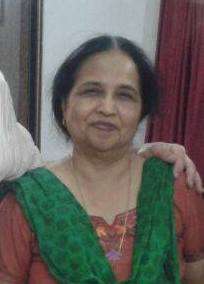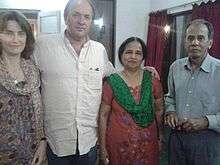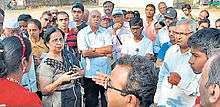Dulari Qureshi
Dulari Qureshi is an Indian academic from Aurangabad, Maharashtra. She holds a Doctorate in Art History; the topic of her thesis being,'Art and Vision of Aurangabad Caves'. She also has a degree in Journalism and a post graduate diploma in Tourism. She has written more than 1,000 articles on art, culture and tourism development and its impacts on monuments. She is a retired professor and Director in the Department of Tourism Administration, Dr. Babasaheb Ambedkar Marathwada University, Aurangabad. She is also the Cultural chairperson of the Ellora-Ajanta Aurangabad Festival.[1] One of her significant contributions is the discovery of inscriptions at Pitalkhora[2] near Aurangabad. Dr Dulari Qureshi is now also the President of Indian Tourist Congress (Western Zone).[3][4]
Dulari Qureshi | |
|---|---|
 | |
| Born | 24 September 1950 |
| Nationality | Indian |
| Occupation | Art historian |
Biography
Dulari Qureshi is the daughter of Professor Ramesh Shankar Gupte, an art historian, author and the former head of Department of History and a senior professor in Dr. Babasaheb Ambedkar Marathwada University in Aurangabad. He was in the Boon University, USA as a visiting Professor. Her mother Nalini Gupte was a practising physician.
Work

Dr Dulari Qureshi has made an allround contribution in the field of Art, History and Journalism. She has written more than 20 research articles which were published on national level in books and journals.[5] Apart from her research work, she also contributes articles, feature stories, conducts interviews of famous personalities and has more than 500 articles and other stories to her credit. She started a series of articles and feature stories on the gates of Auranagabad, their present condition which received attention on national level. More so, to promote the local culture and tourism, Dr Dulari along with Dr Morwanchikar took efforts to start the Ellora-Aurangabad festival, of which she is the cultural chairperson, which is held annually.[6]
History Activist
Apart from being a Historian Dr Dulari Qureshi is also a History activist. She played a major role in coercing the ASI to plan and to carry out some rock-buttressing and waterproofing works in the Ajanta Caves along with the chemical conservation of a few of its frescoes. Dr Dulari along with Dr Morwonchikar and Dr Walter Spink also pointed out the blunders made at Ajanta by conservators in the past. They opined that only those frescoes in immediate danger of crumbling should be attended to by the ASI or any other national or International body working for the conservation of Ajanta caves.[7][8]
Her Association

She is closely associated with a number of organisations which are as follows:
- The Tourism Advisory Board; Maharashtra
- Executive Member; Indian National Trust for Art and Cultural Heritage
- Expert Committee on Antiquities ASI
- Cultural Chairperson; Ellora Ajanta Aurangabad Festival Committee
- She was also Joint Secretary of the World Management Conference held in Aurangabad in October 1999
- Member of the Heritage Committee formed by the Aurangabad Municipal Corporation
Books written
- Art and Vision of Aurangabad Caves[9]
- Tourism Potential in Aurangabad[10]
- Fort of Daulatabad
- Rock Cut Temples of Western India
- Sculptures of Marathwada
- Ajanta, Sculpture, Architecture and Painting
- Encyclopedia of Hindu Temples (co-writer)
- Encyclopedia of Buddhist Temples (co-writer)
- Encyclopedia of Jain Temples (co-writer)
- Encyclopedia of Muslim Monuments (co-writer)
Books edited
- Encyclopedia on Hinduism, Buddhism, Jainism and Islam (IV Volumes)
References
- Syed, Rizwanullah (3 October 2009). "Ellora-Ajanta festival cancelled. Reason swine flu". The Times of India. Retrieved 17 November 2013.
- Unhale, Sanjeev (4 December 1991). "Cave inscriptions discovered". The Times of India. Mumbai, India.
- Webindia 123
- About the author Archived 23 February 2012 at the Wayback Machine
- Times of India
- "Dulari Qureshi". MLBD.com. Archived from the original on 14 July 2011. Retrieved 21 March 2010.
- TOI (19 December 2002). "ASI plans to shore up boulders at Ajanta". The Times of India.
- Das Zoya (19 January 2003). "Ajanta frescoes get a facelift". The Sunday Tribune. Retrieved 21 March 2010.
- "Book details". Bharatiya Kala Prakashan. Retrieved 6 March 2010.
- Flipkart. "Tourism Potential in Aurangabad: With Ajanta, Ellora and Daultabad". Archived from the original on 27 May 2012. Retrieved 6 March 2010.